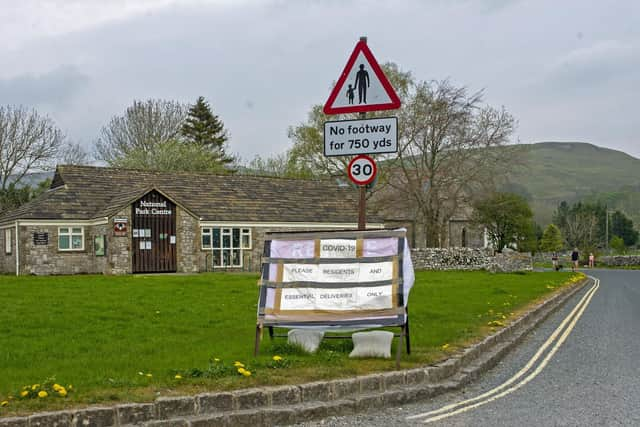What is likely to change if lockdown measures are eased and what isn't?
While the aim is to get the economy back up and running, it is likely that social distancing measures will remain in place for some time.
But what will and won't go back to normal straight away?
Here are some of the changes that could be made as early as next week.


What will change?
Advertisement
Hide AdAdvertisement
Hide AdIt appears initial changes will focus around the amount of time people are allowed to spend outside.
Public Health England has signalled the "stay home" message could be abandoned and reports suggest that those using benches, having picnics or sunbathing will no longer be asked to move on, provided they keep two metres apart.
It means families may even be allowed to travel to the countryside for walks and day trips, as long as they follow social distancing rules.
Matt Hancock suggested on Wednesday that outdoor "pavement cafes" could be put in place over the summer which, if successful, may prompt further use in future.
Advertisement
Hide AdAdvertisement
Hide AdEmployees in non-essential industries who have been operating from home may well be allowed to return to work, with the Government expected to call for masks to be worn on public transport during busy periods.
Businesses wanting employees to return to the office could be made to stagger shifts, put up signs asking workers to stay two metres apart and ensure there are hand-washing facilities, hand gel and PPE supplies readily available.
Bus and train timetables are likely to be adjusted and increased to help the system cope initially with the increase in passengers.
An economic think tank has also suggested that increasing peak-time ticket prices on London's Tube and buses could help manage passenger numbers.
Advertisement
Hide AdAdvertisement
Hide AdOther areas of transport may see more eco-friendly changes, and some London boroughs have announced plans to widen pavements and close roads, bringing about what Boris Johnson has called "a new golden age for cycling".
Meanwhile, fast food franchises including McDonalds and KFC have already announced they will begin opening locations for delivery services, with more and more sites likely to reopen in the coming weeks.
And many sporting events such as football matches are set to begin the transition by staging events behind closed doors, or at "neutral venues" as early as June - an option Matt Hancock says he is "absolutely open to."
What won't change?
Despite the potential easing, life is unlikely to return to normal for a while and ministers have warned that Britons may have to get used to a "new normal".
Advertisement
Hide AdAdvertisement
Hide AdSocial distancing measures and stricter hygiene rules are likely to remain in place in many places for the foreseeable to ensure that the disease is kept under control.
Supermarkets and other high street shops are also likely to continue with measures such as floor markings to keep customers apart, while also using screens, visors and gloves to safeguard staff members.
The use of virtual teaching is also likely to continue, as uncertainty still remains about whether school and university students will begin the new academic year in September in person, or remotely.
When children do return to school, class sizes could be limited as well as new, alternative classroom layouts and staggered break times to keep pupils and teachers safe.
Advertisement
Hide AdAdvertisement
Hide AdIt is also unlikely international travel will get back to normal any time soon, but airports are looking at introducing precautions to ensure passengers can be kept safe when more widespread travel does resume.
Heathrow Airport has already said it will introduce temperature screening, which will initially be used to monitor arriving passengers in immigration halls but could also be deployed in areas for departures, connections and airport staff searches.
A message from the Editor:
Thank you for reading this story on our website. These are challenging times but the team at the Yorkshire Evening Post need your support more than ever in the weeks ahead.
While I have your attention, I also have an important request to make of you. In order for us to continue to provide high quality and trusted local news on this free-to-read site, I am asking you - wherever possible and providing it is safe for you to do so - to also please purchase a copy of our newspaper.
Advertisement
Hide AdAdvertisement
Hide AdInevitably falling advertising revenues will start to have an impact on local newspapers and the way we continue to work during this period of uncertainty. So the support of our readers has never been more important as we try to make sure that we keep you connected with the city you live in during this time. But being your eyes and ears comes at a price. We need your support more than ever to buy our newspapers during this crisis.
Our team of trusted reporters are working incredibly hard behind the scenes- from kitchen tables and spare bedrooms - to look at how we can do this and your continued support to the YEP will help to protect its viability in the days and weeks ahead.
For more details on our subscription offers please visit www.localsubsplus.co.uk/YEP, email [email protected] or call us on 0330 4033004
Thank you
Laura Collins
Editor